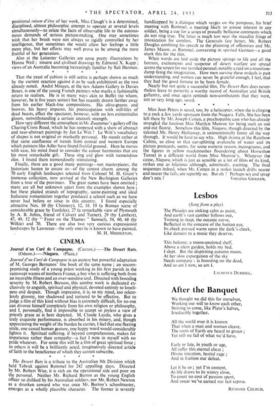CINEMA
Journal d'un Cure de Campagne. (Curzon.)—The Desert Rats. (Odeon.)—Niagara. (Plaza.)
Journal d'un Cure de Campagne is an austere but powerful adaptation of M. Georges Bernanos' fine book of the same name ; an uncom- promising study of a young priest working in his first parish in the rainswept wastes of northern France, a boy who is suffering both from an incurable illness and an over-sensitive soul. Directed with brooding severity by M. Robert Bresson, this sombre work is dedicated ex- clusively to anguish, spiritual and physical, devoted entirely to loneli- ness and despair. Though impressive, it is, to my mind, too relent- lessly gloomy, too shadowed and tortured to be effective. But to judge a film of this kind without bias is extremely difficult, for no one can divorce himself completely from his own religion or philosophy, and I, personally, find it impossible to accept so joyless a view of priestly grace as is here depicted. M. Claude Laydu, who gives a truly exquisite performance, is absorbed in his misery, and, though appreciating the weight of the burden he carries, I feel that one fleeting smile, one casual human gesture, one happy word would considerably lighten it. Spiritual suffering, if beyond comprehension, makes for impatience rather than sympathy—a fact I note in myself with no pride whatever. For some this will be a film of great spiritual force ; to others it will be a brilliantly acted, imaginatively directed article of faith to the beneficence of which they cannot subscribe.
•
The Desert Rats is a tribute to the Australian 9th Division which held Tobruk against Rommel for 242 appalling days. Directed by Mr. Robert Wise, it is rich on the operational side and poor on the personal. Neither Mr. Richard Burton as the young English officer so disliked by his Australian soldiers, nor Mr. Robert Newton as a drunken coward who was once Mr. Burton's schoolmaster, emerges as a wholly plausible character. The former is severely handicapped by a dialogue which verges on the pompous, his brief meeting with Rommel, a meeting likely to arouse interest in any soldier, being a cue for a series of proudly bellicose comments which do not ring true. The latter is much too near the maudlin fringe of intoxication for comfort. The Generals fare better, Mr. Robert Douglas confining his speech to the planning of offensives and Mr. James Mason, as Rommel, conversing in spirited German—a good mark this for the film.
When words are laid aside the picture springs to life and all the horrors, excitements and suspense of desert warfare are spread across the screen for our terrified perusal, notably a raid on a munition- dump firing the imagination. How men survive these ordeals is past understanding, and women can never be grateful enough, I feel, that they had the good fortune to be born female.
Nearly but not quite a successful film, The Desert Rats does never- theless leave to posterity a worthy record of Australian and British gallantry, and once again reminds non-combatants that they were, not so very long ago, saved. . • • • Miss Jean Peters is saved, too, by a helicopter, when she is clinging to a rock a few yards upstream from the Niagara Falls. She has been left there by Mr. Joseph Cotten, a psychopathic case who has already strangled the luscious Miss Marilyn Munroe for being such an out and out floozie. Somehow this film, Niagara, though directed by the talented Mr. Henry Hathaway, is unintentionally funny all the way through. It would be hard to say why. High drama at the Rainbow Cabins, so close to that ear-splitting avalanche of water and its picture postcards, seems, for some esoteric reason, incongruous, and the figures in yellow mackintoshes floundering about Horseshoe Tunnel in a different world from Miss Munroe's. Whatever the cause, Niagara, which is just as sensible as a lot of films of its kind, strikes one as hilarious although, admittedly, exciting. The final sequences indeed, when Mr. Cotten in a stolen launch drifts nearer and nearer the falls, are superbly so. But oh ! Perhaps sex and spray


































 Previous page
Previous page